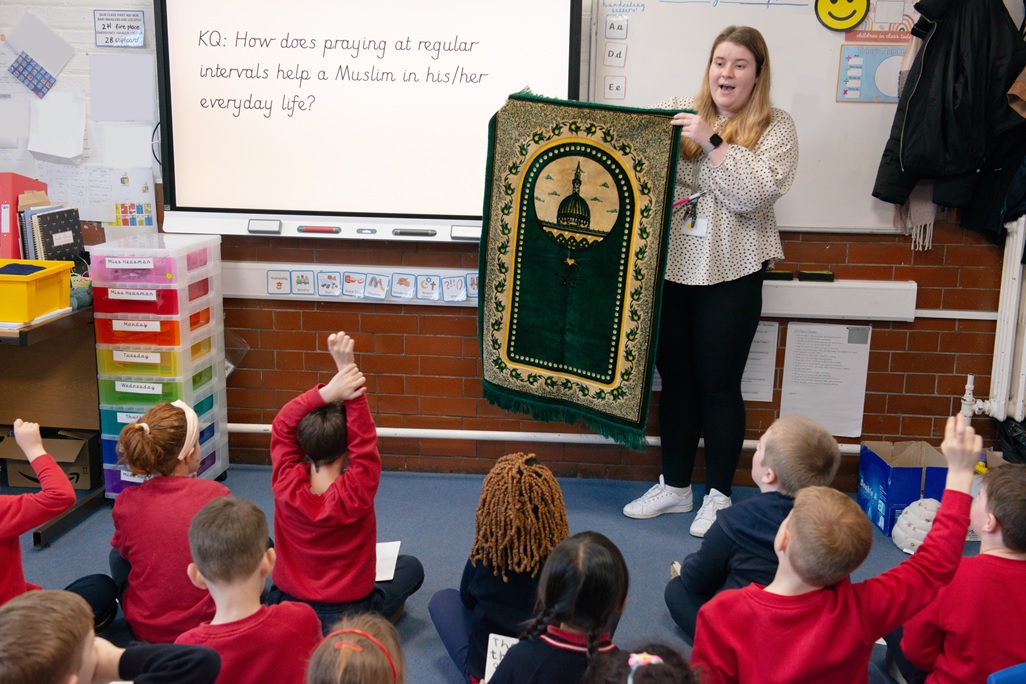Religious Education
Our RE curriculum is designed, using Discovery and Understanding Christianity, to give children an appreciation and understanding of core Christian concepts, other major religions of the world and a non-world religion (Humanism). Where possible, our RE curriculum makes links between religions studied and Global Neighbours through cross curricular links.
Intent: What we expect children to learn
Through RE we aim to enable pupils to know about and understand Christianity as a living world faith, by exploring core theological concepts and to develop knowledge and skills in making sense of biblical texts and understanding their impact in the lives of Christians. We also aim to develop a knowledge and meaningful understanding of other world faiths particularly those represented in the UK and how religious beliefs shape our lives and our behaviour, develop the ability to make reasoned and informed judgements about religious and moral issues and enhance our spiritual, moral, social and cultural development. We also look at a non-world religion in year 6, which is Humanism.
As a Church of England school, Religious Education plays an important role, along with all other curriculum areas, particularly PSHE and the teaching of British Values, in promoting the spiritual, moral, social, and cultural development of our children.
Implementation: How we teach the subject
RE skills are taught and developed through the units of work. Through a spiral curriculum, each year group studies Christianity and one other main world religion. Learning is embedded by making links between previous and current learning and different religions to create connections between knowledge. Lessons are designed to be as interactive and engaging as possible making links between new knowledge and children’s own experiences. Children will also be given experiences through educational visits and guest speakers to bring learning to life. Children are encouraged to ask questions to develop their thinking and learning.
Impact: How we evaluate the knowledge and skills they have learned
Through an engaging and exciting RE curriculum, all children will make progress and develop their skills and knowledge. At the end of each unit teachers assess their learning through an assessment task. By the end of their primary education, pupils will be able to use the following skills:
- Investigation – this includes: asking relevant questions; knowing how to use a variety of sources in order to gather information.
- Interpretation – this includes: the ability to draw meaning from artefacts, works of art, poetry and symbolism; the ability to interpret religious language.
- Reflection – this includes: the ability to reflect on feelings, experience, attitudes, beliefs, values, relationships, practices and ultimate questions.
- Empathy – this includes: the ability to consider the thoughts, feelings, experiences, attitudes, beliefs and values of others
Children are assessed in a variety of ways allowing them to demonstrate their knowledge and overcome barriers to learning, such as difficulties with reading and writing.
Progression Map:
|
Religious Curriculum Overview |
||||||
|
EYFS |
Year 1 |
Year 2 |
Year 3 |
Year 4 |
Year 5 |
Year 6 |
|
Understanding Christianity – Creation |
Understanding Christianity – Creation |
Discovery – What did Jesus teach
|
Discovery – Diwali
|
Discovery – Beliefs and practices |
Discovery – belief into action |
Discovery – beliefs and practices |
|
Understanding Christianity – Incarnation -
|
Understanding Christianity – Incarnation -
|
Understanding Christianity – Gospels
|
Understanding Christianity – Incarnation |
Understanding Christianity – People of God
|
Understanding Christianity – Incarnation |
Understanding Christianity – Gospels
|
|
Discovery – celebrations
|
Discovery – Jesus as a friend
|
Discovery – Prayer at home
|
Understanding Christianity – creation/fall
|
Discovery - Passover |
Discovery - Beliefs and moral practices |
Understanding Christianity – Creation/Humanism |
|
Understanding Christianity – Salvation
|
Understanding Christianity – Salvation
|
Understanding Christianity – God
|
Understanding Christianity – Salvation
|
Understanding Christianity - Easter |
Understanding Christianity – Salvation
|
Understanding Christianity – Salvation
|
|
Discovery – Stories from different religions.
|
Discovery – Shabbat
|
Discovery – Community and belonging
|
Discovery – Hindu beliefs |
Discovery - Rites of passage and good work |
Discovery - Prayer and worship |
Discovery – beliefs and moral values |
|
Discovery – Special places |
Discovery – Rosh Hashanah and Yom Kippur.
|
Discovery – Hajj
|
Discovery -Pilgrimage to the river Ganges |
Understanding Christianity - Kingdom of God |
Understanding Christianity – God
|
Discovery – beliefs and moral values |
|
|
World religion - Judaism |
World religion - Islam |
World religion – Hindu traditions |
World religion - Judaism |
World religion – Sikh traditions |
World religion - Islam |

